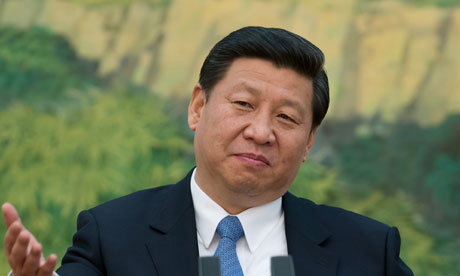US and China to discuss cybersecurity at high-level diplomatic meetings
US hopes new Chinese president, who will meet Obama on Friday, can rein in hackers attached to military

China's new leader, Xi Jinping, will meet Barack Obama on Friday. Photograph: Pool/Getty Images
The scourge of military and commercial hacking is to become the subject of high-level diplomatic talks between the US and China, in an apparent effort to end tension between Beijing and Washington over recent online attacks.
The meetings, which will begin in July, are the first formal attempt to break the growing threat to cybersecurity posed by military-backed hacking operations. In recent weeks the US government has complained in increasingly shrill terms about breaches into some of the country's most sensitive infrastructure – including core military systems and new product development by many leading US businesses – by hackers thought to be based in Beijing and Shanghai.
Cyberespionage is likely to be a prominent item on the agenda when President Obama hosts the new Chinese president, Xi Jinping, for a special summit in Rancho Mirage, California on Friday. The meeting, which is being billed as a getting-to-know-you exercise for the two presidents, is a reflection on the part of US officials that they see in Xi a politician who might have greater success than predecessors in reining in hackers attached to the Chinese military.
Cries of foul-play have been dramatically stepped up in recent weeks by the US administration. Last week the Washington Post obtained confidential portions of a report for the Pentagon by the Defense Science Board that warned that Chinese hackers had cracked into the programs for many of the US military's most sensitive advanced weapons systems. Compromised designs included the advanced Patriot missile system, an Army system for intercepting ballistic missiles and the Navy Aegis ballistic-missile defence system.
In addition, the security firm Mandiant has identified a unit of the People's Liberation based outside Shanghai as the source of more than 140 attacks on many of America's top institutions, including newspapers such as the New York Times, Washington Post and Wall Street Journal, political think tanks and major firms.
China has repeatedly denied the allegations and countered that it sees US military build up in the Asia region – presented by the US as its "new pivot to the Pacific" – as a direct threat to its interests. Chinese commentators have also frequently pointed to Stuxnet, the computer worm that attacked Iran's nuclear programme in 2010 and is believed to have originated with the US working in tandem with Israel, as evidence that the US government is also capable of cyber aggression.
Though Obama is expected to raise the issue directly with Xi on Friday at the 200-acre Sunnylands estate, the discussion is likely to tiptoe around the subject. Officials have told the New York Times that the most highly charged aspect of the allegations – that US military secrets are being stolen on a huge scale – will not be broached as military espionage is considered too hot to handle at this stage by both sides.
Chuck Hagel, the defense secretary, raised anxieties at a security conference in Singapore on Saturday. He talked about the "growing threat of cyberintrusions, some of which appear to be tied to the Chinese government and military".
No comments:
Post a Comment
Comments always welcome!